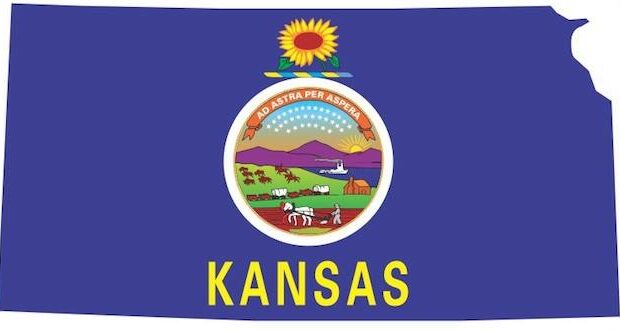This election may go down as one of the most bizarre ever. The results themselves (when they finally came in) were so chaotic that describing them would sound like the proverbial collection of blind men trying to explain the totality of an elephant based on their own personal perspective. Red wave? Blue wave? Victory for pro-abortion advocates? High gas and grocery prices, or just the triumph of incumbency?
Across the country there seem to be pockets of dominance for all the above and Kansas appears to have retained its red state status for the most part.
Certainly, after the August 2nd defeat of Value Them Both, Democrats had reason to be optimistic going into the general election. Democrat candidates running for the legislature were quick to point out to their constituents how their Republican opponents had voted on the measure. Also, campaign ads against 3rd District Republican Congressional candidate Amanda Adkins, Republican gubernatorial candidate Derek Schmidt and Attorney General candidate Kris Kobach all featured ads stating that they would support a ban on all abortions including those for rape, incest and the life of the mother. These three exceptions to abortion have all been supported by vast majorities of the public even though the first two are a minuscule part of those requested and the latter are not usually even considered to be abortions.
It’s the culture, stupid.
Some years back the Democrat mantra was “It’s the economy, stupid” and now that your 401K is down 20% or more, gas and grocery prices have skyrocketed, and inflation is roaring full blast Democrats have decided that what actually matters is their unholy sacrament of abortion.
The opposition to abortion bans, real or imagined, was the driving force behind the Democrats’ attempts to blunt the “red wave” that was anticipated in response to the Biden administration’s many failures and radical agenda. California, Vermont and Michigan had measures on their ballots to enshrine abortion into their Constitutions while Kentucky had a measure that attempted to clarify that abortion was not protected in the Kentucky Constitution. All three of the pro-abortion bills passed and the one that opposed abortion in Kentucky failed. Worse yet, a measure in Montana that would have protected babies born alive unbelievably failed.
The energizing effect that the Supreme Court’s Dobbs decision had on Democrats across the country successfully thwarted Republican attempts to take control of the Senate and limited control of the House to a very thin margin. Kansas state rep Pat Proctor from Leavenworth, who survived being targeted for defeat by Democrats, likened the effect to a dog catching a car. He pointed out that many of the people who had proclaimed their loyalty to the pro-life movement became leery of what could become an all-out ban on abortion. The all or none nature of the various amendments gave the upper hand to Democrats given the constant polling that showed most Americans, including many Republicans, do not want total bans on abortion.
Kansas is still a red state.
Given the results of the August 2nd primary Democrats anticipated a very strong election cycle for them in Kansas. It did not materialize. Overall, Republicans were victorious at every level save for some local races. All four Republican incumbents to Congress were re-elected, Jerry Moran to the Senate and the 1st, 2nd and 4th District Congressmen all retained their seats.
Republicans also swept all four seats on the State Board of Education. The driving force here appears to be the feeling among many parents that schools are spending more time indoctrinating their children into leftist ideology than focusing on solid educational goals. Certainly, the data on achievement tests in Kansas bears that out. The Kansas Policy Institute monitors the state assessment scores and translates those into A to F scores. Based on those rankings 44.5% of Kansas schools received either a D or F ranking. Add the C’s into that equation and 92% received a C or lower score.
Save for the gubernatorial contest, Republicans also took every statewide contest including a win by controversial Attorney
General candidate Kris Kobach. Indeed, Kobach received almost 29,000 votes more than gubernatorial candidate Derek Schmidt. Both Secretary of State Scott Schwab and Insurance Commissioner Vickie Schmidt were incumbents and Treasurer candidate Steve Johnson, a former state rep, was the House number cruncher. None were controversial and indeed, Vickie Schmidt even made some Democrat endorsement lists.
Democrats also focused on eliminating the Republican supermajority in the Kansas House. Several races were targeted and yet Republicans retained a one-vote super majority margin. Ironically, the balance of victory came with the election of Mike Thompson, a Wyandotte County Republican who distanced himself from the local party and focused on local Bonner Springs relationships instead.
Where Republicans failed.
There were three significant losses for Kansas Republicans, the loss of Johnson County as a Republican stronghold, the continuing loss of the 3rd District Congressional seat and the loss, again, of the governor’s mansion. Of the three, two were inevitable while one was not.
Earlier this year the Kansas legislature received some notoriety for what was clearly gerrymandering in an attempt to retake the 3rd District Congressional seat. In order to reduce the number of Democrat votes in the 3rd District, the legislature split heavily Democrat Wyandotte County down the middle using Interstate 70 as the dividing line. The northern half was then placed in the 2nd District while the southern half remained in the 3rd District. Had they taken the time to chat with longtime political analyst, Dwight Sutherland they might have saved themselves both embarrassment and the fact that they may have put the 2nd District into play.
Sutherland has been charting the number of Democrat versus Republican registrations for some time now and is of the opinion that the entirety of Wyandotte County could have been removed from the equation and the increased power of Democrats in Johnson County would have still saved the day for incumbent Sharice Davids.
While the demographic change in voter registrations was one factor there were two other factors that contributed to the loss of both Republican 3rd District Congressional candidate Amanda Adkins and gubernatorial candidate, Derek Schmidt, outside money, and poor messaging.
Nationwide, coastal Democrats have figured out that races for congressional seats and other important statewide offices in flyover country can be overwhelmed for the cost of a city council or district attorney’s seat in their major urban areas. When Kris Kobach was the perceived opponent for the US Senate in 2020, outstate Democrats poured 29 million dollars into the race in an attempt to buy the seat. Fortunately for Republicans, Kobach lost in the primary and a former Congressman from the Big First District, Roger Marshall, managed to pull out the victory. The same occurred in this election and both Adkins and Schmidt were dramatically out spent by their opponents.
One could argue that Laura Kelly and Sharice Davids’ incumbency itself would have led to large war chests and there may be some truth to that argument, but the one thing incumbency does not bring is a dominant message. Given the environment in DC with the Biden administration and the poor economic news plaguing Democrats in general, Republicans should have had the edge in messaging. However, in both the Adkins and Schmidt races (as well as the VTB campaign) the Democrat narrative prevailed.
In both races Democrats made Adkins and Schmidt’s ties to former Kansas governor Sam Brownback their centerpiece. The ads focused on Brownback’s tax policies and the false claim that he cut spending on education. According to Dwight Sutherland, those cuts to education were made by Brownback’s predecessor, Kathleen Sebelius, owing to an economic downturn in the Kansas economy two years before Brownback took office. Despite that, I know of no attempt anywhere by either campaign to defend Brownback’s record or to refute the false claims against a successful former Congressman, Senator and two term governor.
The myth of Dennis Pyle
Like many, I looked at the vote totals for the gubernatorial contest and noted that the difference between Laura Kelly’s total and Schmidt’s was roughly identical to the number of votes received by Pyle and concluded that he was the cause of Schmidt’s defeat. That assumption was wrong. Certainly, Pyle’s temper tantrum did Schmidt no favors, and it gave Democrats the opportunity of spending even more of their largesse attacking Schmidt from the right by funding much of Pyle’s campaign. However, a closer examination of the numbers indicates that other factors were at play in Schmidt’s defeat.
Normally, the top of the party’s ticket receives the most votes and then totals drop off the farther down the ballot one goes, but that was not the case this time. Below are the vote totals for the statewide races.
| Laura Kelly | Governor | 492,209 |
| Derek Schmidt | Governor | 472,323 |
| Scott Schwab | Secretary of State | 573,637 |
| Kris Kobach | Attorney General | 500,049 |
| Steven Johnson | State Treasurer | 530,493 |
| Vicki Schmidt | Commissioner of Insurance | 609,778 |
Had Schmidt even received the same number of votes as the next highest winning candidate, he would now be governor. Pyle received only 20,057 votes and it’s doubtful that Schmidt would have received all of those votes had he not run. Furthermore, Brownback had the same issue when he ran and still prevailed despite a third party candidate receiving over 4% of the vote.
 Schmidt cannot be faulted as a candidate. He campaigned more energetically than any other candidate, nor can the loss be attributed to ideology. Schwab, Johnson and Vickie Schmidt are all more moderate than Schmidt while Kobach was more conservative and more controversial and yet all four won. Clearly, Schmidt underperformed the rest of the ticket and so we’re therefore left with money and messaging as possible culprits behind Schmidt’s loss. Mike Egan, a major donor to conservative causes, argues that money was the dominant factor and increased funding very well might have put Schmidt over the top. That said, the pro and con forces on the Value Them Both campaign had similar amounts of money and yet left-wing messaging dominated the campaign.
Schmidt cannot be faulted as a candidate. He campaigned more energetically than any other candidate, nor can the loss be attributed to ideology. Schwab, Johnson and Vickie Schmidt are all more moderate than Schmidt while Kobach was more conservative and more controversial and yet all four won. Clearly, Schmidt underperformed the rest of the ticket and so we’re therefore left with money and messaging as possible culprits behind Schmidt’s loss. Mike Egan, a major donor to conservative causes, argues that money was the dominant factor and increased funding very well might have put Schmidt over the top. That said, the pro and con forces on the Value Them Both campaign had similar amounts of money and yet left-wing messaging dominated the campaign.
Whither Johnson County.
The time has come when we can move Johnson County into the same column with Douglas and Wyandotte counties as Democrat strongholds. The change has been coming now for several election cycles and can’t really be attributed to any single candidate or election. Democrats simply have a combination of more energy and positive demographic changes giving them the edge. In this latest race for County Commissioners and the Chair of the Commission, Mike Kelly, a left-wing attorney won the race for commission chair while all three of the commission seats were retained by incumbents, two Democrats and a Republican embraced by the Democrats.
In the statewide races, moderate Senator Jerry Moran lost in only three counties, Douglas, Wyandotte and Johnson. The only statewide Republican candidate to win in Johnson County was Vickie Schmidt. While there are still pockets of Republican majorities, there are fewer every cycle and several legislative candidates that were formerly moderate Republicans have either switched parties, or, like Melissa Rooker, lost to Democrats.
–John Altevogt | Metro Voice
 Metro Voice News Celebrating Faith, Family & Community
Metro Voice News Celebrating Faith, Family & Community














